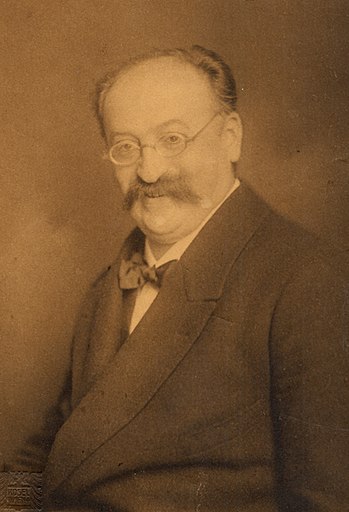
Heinrich Schenker
Rakouský hudební teoretik a skladatel

Heinrich Schenker byl rakouský hudební teoretik a skladatel haličského židovského původu. Wikipedia
- Narození19. 6. 1868, Višnivčyk, dnešní Ukrajina
- Úmrtí14. 1. 1935 (66 let), Vídeň
Heinrich Schenker – Wikipedie
Schenker doprovázel zpěváky a komorní hudebníky a také sám začal komponovat. Nakonec se však komponování vzdal a nadále se věnoval otázkám hudební teorie.
Heinrich Schenker - Wikipedia
Heinrich Schenker (19 June 1868 – 14 January 1935) was an Austrian music theorist whose writings have had a profound influence on subsequent musical analysis. [1 ] His approach, now termed Schenkerian analysis, was most fully explained in a…
Heinrich Schenker | Music Analysis, Theory & Criticism…
Heinrich Schenker was an Austrian music theorist whose insights into the structural hierarchies underlying much of 18th- and 19th-century music led to a new understanding of the laws of melodic and harmonic construction and form.
Heinrich Schenker | Megabooks CZ
Heinrich Schenker: A Research and Information Guide is an annotated bibliography concerning both the nature of primary sources related to the composer and the scope and significance of the secondary sources which deal with him, his…
Heinrich Schenker - Wikiquote
Quoted in Burkhart, Charles (1983). "Schenker's Theory of Levels and Musical Performance", Aspects of Schenkerian Theory, Beach David, ed. New Haven: Yale University Press.
Heinrich Schenker: teoretik a editor | Masarykova univerzita
Heinrich Schenker, autor pozoruhodné analytické teorie, byl soukromým učitelem skladby a klavíru. V této studii je však představen jako editor děl německé klasiky.
Výpis publikací
Heinrich Schenker: Der Antiheld der Moderne? Über einige Formen der Angst in der Musik.
Category:Schenker, Heinrich – Imslp
Aliases: Шенкер, Генрих, Schenker, Шенкер Генріх, Гейнріх Шенкер, Шенкер Гейнріх, ハインリッヒ・シェンカー, Arthur Niloff
Heinrich Schenker - Kapitoly z hudební teorie a analýzy
Schenker ve svých teoretických spisech hovoří o vyhledávání nosných hlasů, odkrývání jednotlivých vrstev partitury a obecných modelů bez ohledu na historické proměny stylu, obsahu a funkce zkoumaného díla.
Cena 340 KčSkladem
Na návštěvě u Lubomíra Spurného | D-dur
Poslední dubnový víkend strávíme ve společnosti muzikologa, pedagoga a ředitele Institutu terezínských skladatelů Lubomíra Spurného, jenž nám prostřednictvím hudby představí nejen své vědecké projekty, ale i autory a jejich mimořádná díla…
odkazuje na služby nejen od Seznam.cz.
© 1996–2025 Seznam.cz, a.s.

